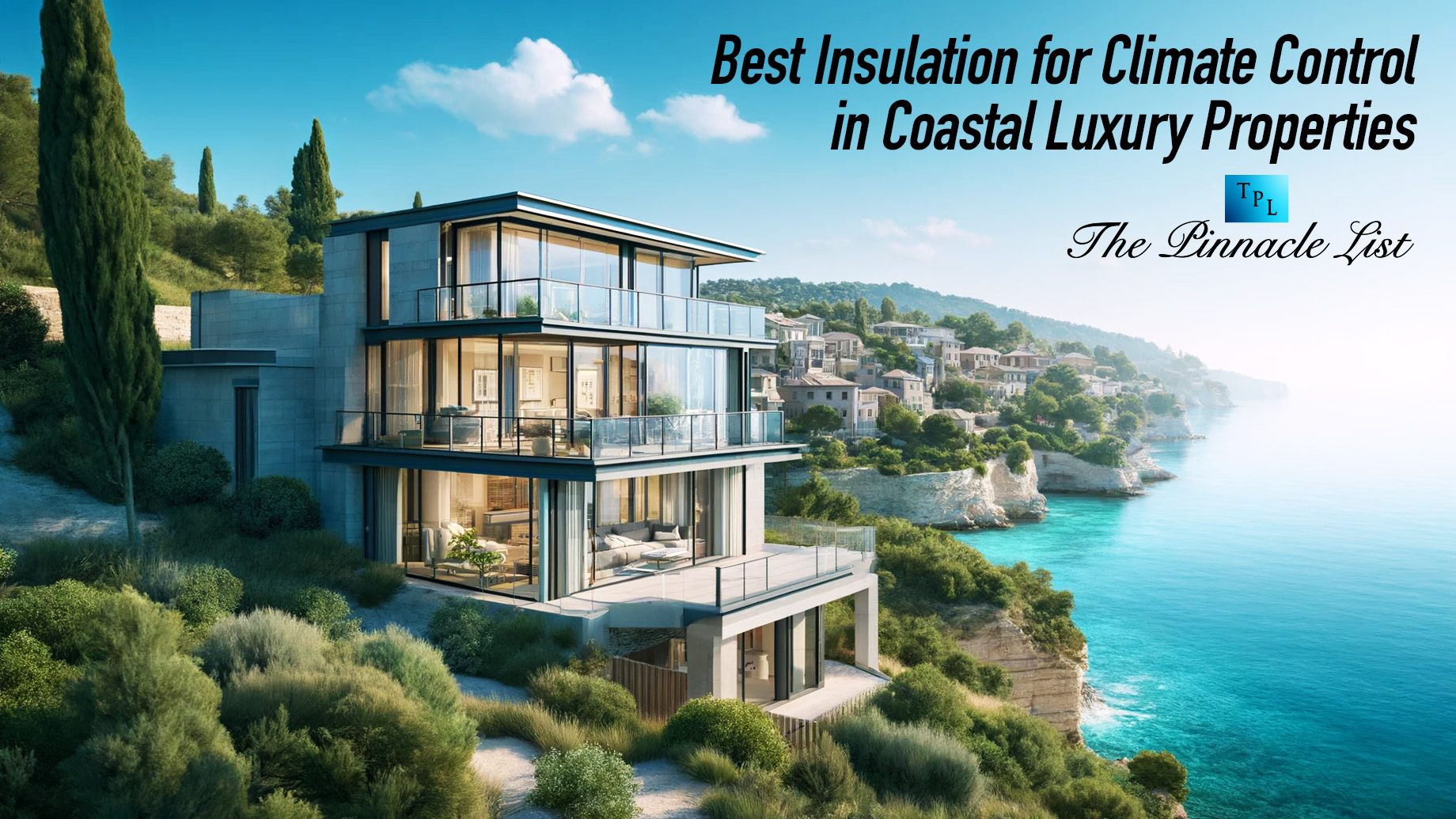
Living in a coastal luxury property has its perks—breathtaking ocean views, fresh sea breezes, and the soothing sound of waves. However, these idyllic settings come with their own set of challenges when it comes to climate control. Insulating these homes effectively is crucial for maintaining comfort and energy efficiency, especially given that coastal areas can experience extreme weather conditions.
With nearly two-thirds of homes in the UK needing better insulation, it’s clear that even high-end properties aren’t immune to the inefficiencies plaguing older buildings. The cost of retrofitting can be steep, but the benefits far outweigh the initial investment. Proper insulation not only keeps your home cozy year-round but also significantly reduces energy consumption, making it a smart choice for both your wallet and the environment.
Importance of Insulation in Coastal Luxury Properties
Climate Challenges in Coastal Areas
Coastal luxury properties face unique climate challenges like high humidity, salt exposure, and strong winds. These environmental factors can degrade building materials faster than in inland areas. For instance, high humidity can lead to mold growth, while salt can corrode metal fixtures. Strong winds can cause draft issues, making interior climate control more difficult. Without proper insulation, it becomes challenging to maintain a stable indoor temperature, leading to increased energy consumption.
Benefits of Adequate Insulation
Adequate insulation in coastal luxury properties offers several benefits. First, it enhances comfort by keeping indoor temperatures stable, regardless of external weather conditions. Effective insulation reduces the need for heating or cooling systems, which lowers energy bills and minimizes environmental impact. Additionally, cutting-edge insulation solutions can protect the property from moisture and salt damage, extending the lifespan of building materials. Insulating walls, lofts, and floors helps create a barrier against external climate challenges, contributing to a healthier living environment by preventing mold and mildew growth.
Types of Insulation Suitable for Coastal Properties
Closed Cell Insulation
Closed cell insulation offers exceptional benefits for coastal properties. This type of spray foam insulation provides a high R-value, significantly reducing heat flow within homes. Closed cell foam starts at an 88.6% heat flow reduction per inch and can reach up to 97.9% with six inches of thickness. Besides its superior thermal properties, closed cell insulation excels at sealing out moisture and air, which is crucial in humid coastal environments. Additionally, this insulation adds structural integrity by reinforcing walls and roofs, making it a cutting-edge insulation solution for luxury coastal homes.
Marine and Offshore Insulation Options
Marine and offshore insulation solutions are designed to withstand harsh coastal conditions. Materials like fiberglass and mineral wool are known for their fire resistance and soundproofing. However, spray foam insulation is particularly effective for these settings. It expands to form a continuous barrier, offering robust protection against air and water infiltration. This makes it ideal for hard-to-reach areas often exposed to salty air and high moisture levels. Given the specialized needs of coastal properties, combining different types of insulation for optimal performance can improve climate control and longevity.
Effective Insulation Practices for Coastal Homes
Key Installation Techniques
Implementing cutting-edge insulation solutions is key to maximizing climate control in coastal homes. Using closed-cell spray foam, which offers a high R-value and excellent moisture-sealing properties, is particularly effective. This type of foam not only resists water infiltration but also provides structural support, enhancing the overall durability of the home.
Additionally, employing a fabric-first approach ensures that other elements, like walls and lofts, are insulated efficiently before any heating systems are upgraded. Techniques such as blown-in cellulose insulation are also beneficial for filling small cavities and resisting airflow. These measures minimize the risk of mold and rot, which are common in coastal environments due to high humidity levels.
Areas of Focus: Windows, Doors, and Roofs
Focusing on key areas like windows, doors, and roofs is crucial for effective insulation. Triple-glazed windows with low-E coatings can reduce heat transfer while blocking ultraviolet rays, which is vital for maintaining temperature stability. Ensuring door seals are airtight is another essential step, as even small gaps can lead to significant energy loss.
For roofs, reflective barriers prove highly effective in coastal regions where temperatures can fluctuate. These barriers block radiant heat transfer, making them ideal for attics and other spaces exposed to direct sunlight. Additionally, using spray foam insulation on rooflines and under eaves helps create a seamless barrier against both air and water infiltration.
Investing in these insulation solutions can significantly enhance the comfort and energy efficiency of coastal luxury properties, making them better equipped to handle the unique challenges posed by their environment.
Energy Efficiency and Cost Benefits
Long-Term Savings on Heating and Cooling
Insulation in coastal luxury properties significantly reduces heating and cooling costs. For instance, closed-cell insulation and marine insulation options like spray foam create efficient thermal barriers. These insulation solutions maintain consistent indoor temperatures by reducing heat transfer through walls, roofs, and floors. Properly installed insulation can offer energy savings up to 15% on heating and cooling expenses annually.
Take, for instance, the attic—a common area for air leakage. By insulating it, homeowners ensure a more uniform indoor temperature and reduce energy waste. Reflective barriers in this area combat radiant heat transfer, especially useful in hot climates. The return on investment for such insulation is remarkably high, with each dollar spent on insulation yielding over $4 in energy savings, home valuation, and other benefits.
Enhancing Property Value Through Efficient Insulation
Investing in high-performance insulation not only cuts energy costs but also increases property value. Statistics indicate that homes with superior insulation sell for 23% more than their non-insulated counterparts. Efficient insulation, including triple-glazed windows and airtight door seals, showcases a commitment to sustainable living, thus appealing to environmentally conscious buyers.
For coastal luxury properties, the use of advanced, environmentally friendly materials like double-glazed bifold doors enhances both aesthetic appeal and market value. Acoustic insulation up to 40 dB and energy efficiency ratings with a U-value of 1.8 make these properties stand out. By incorporating these insulation solutions, homeowners can expect a significant boost in their property’s market valuation while enjoying lower utility bills.
Challenges and Solutions in Insulating Coastal Luxury Properties
Dealing With High Humidity and Saline Environment
Humidity and salinity present significant challenges in coastal properties. High moisture levels can promote mold growth and rot, affecting structural integrity. Saline conditions corrode building materials, reducing lifespan. Closed-cell spray foam insulation counters these issues effectively. It provides a moisture barrier, preventing dampness from seeping into walls and floors.
Material Selection and Maintenance Considerations
Choosing the right materials is crucial. Coastal properties benefit from marine-grade insulation, such as fiberglass and polystyrene, which are known for durability in harsh conditions. Reflective barriers enhance energy efficiency by deflecting UV rays and keeping interiors cool. Regular maintenance ensures long-term performance. Periodic inspections help identify any wear or damage early. Tightening seals around windows and doors prevents air leakage, maintaining insulation effectiveness. Combining these steps provides robust climate control in luxury coastal residences.
